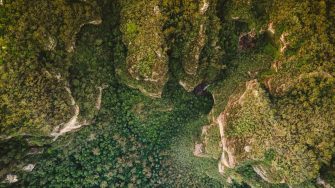Making nature's wealth count
The Sustainable Development Goals recognise that “social and economic development depends on the sustainable management of our planet’s natural resources”, including the biodiversity and ecosystems therein.
The Sustainable Development Goals recognise that “social and economic development depends on the sustainable management of our planet’s natural resources”, including the biodiversity and ecosystems therein.

The Sustainable Development Goals recognise that “social and economic development depends on the sustainable management of our planet’s natural resources”, including the biodiversity and ecosystems therein. To achieve the future we want for Australia, we need to change our measures of economic success to guide us on a more sustainable path.
Global commitments to “make nature count” in social and economic decision-making are now embedded in the 2030 Agenda for Sustainable Development, draft Post-2020 Global Biodiversity Framework, and across a growing range of leaders’ commitments such as those made in 2020 by the 17 Heads of Government represented on the High Level Panel for a Sustainable Ocean Economy (Ocean Panel), in 2021 by the Leaders’ of the G20, and through the ongoing work of the Taskforce on Nature-related Financial Disclosures (TNFD).
In Australia, a growing number of public and private sector institutions have committed to making nature’s wealth count through diverse initiatives such as the National Strategy and Action Plan for Environmental-Economic Accounting, Australian leadership in Sustainable Ocean Management, development of a National Voluntary Biodiversity Market and other Financing Solutions for Nature, and multi-sector Australian contributions to the TNFD.
Meeting these commitments depends on urgent collaborative action to compile and use natural capital accounts (also commonly referred to as environmental-economic accounts)—which connect social, economic and environmental information about nature in coherent and comparable formats, in line with international statistical standards such as the System of Environmental Economic Accounting. As a global leader in measuring and accounting for nature, Australia is well placed to seize the opportunities that can flow from embedding nature's value in all key decisions that shape our common future.
This event was the inaugural National Dialogue on Natural Capital Accounting, Policy and Practice in Australia. It aimed to strengthen mutual awareness and action planning across Australian institutions and communities concerning natural capital accounting, recognising its critical role as a foundation of measurement, innovation, investment, management and planning of progress towards Australia’s long-term well-being.
It featured a scene-setting discussion between government, business and third sector thought leaders, followed by facilitated discussion (with 180 participants) to identify opportunities for natural capital accounting, policy and practice development for sustainable finance and investment, environmental policy and regulation, and social and economic policy and assessment. The discussion was informed by a series of background presentations prepared by leading subject matter experts across Australia, and intended to lay a foundation for ongoing outcome-focused collaboration between the public, private and third sectors.
The Dialogue was hosted by the Australian Government Department of Climate Change, Energy, the Environment and Water (DCCEEW) and facilitated by the UNSW Sustainable Development Reform Hub.
Authors: Ben Milligan, Director at the GOAP.